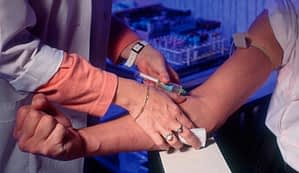What is a chemical test for DUI?
What exactly is a chemical test for DUI? How many types are there? Can they save my driver’s license? This article addresses these questions and more.
In recent months, I’ve noticed an increasing amount of DUI (known in Michigan as operating while intoxicated, OWI) cases coming to our firm dealing with blood draws.
To many people who’ve never been stopped for DUI, the idea of a blood draw may seem confusing.
Let’s take a minute to set the record straight on police officer’s chemical tests:
Are you facing DUI charges? Unhappy with your current attorney? Request a free consultation now.
1. Preliminary Breath Test
If you’ve been pulled over for an DUI, the officer will likely ask you to take a Preliminary Breath Test (“PBT”).
This roadside test involves you blowing into the officer’s machine to determine your breath alcohol level.
You don’t have to take this test.
If you decide to refuse this test, you’ll be issued a civil infraction.
There are no points associated with this civil infraction, and the fine is usually around $150. (If you have a CDL, there are additional penalties).
This is the test people most often think of when asked what is a chemical test for DUI.
2. Arrest Based on Preliminary Breath Test
In Michigan, an officer may arrest a person based in whole or in part upon this PBT result.
Therefore, even if you completely passed the officer’s field sobriety tests, an officer will have enough probable cause to arrest you based on this single breath test.
While an argument can still be made that your performance shows there were issues with the PBT result, this greatly complicates matters.
3. Chemical Test for DUI- What Are My Rights?
Once you’re arrested, you’ll be taken to the police station and read your “Chemical Test Rights.”
In Michigan, the officer must advise you of the nature of the test, the penalties for refusal, and the possible license sanctions that will accompany a refusal.
It’s extremely important that you fully understand the penalties for refusal.
4. Asked to Take Chemical Test
Whether or not you took the officer’s PBT on the roadside, you’ll still be asked to take this chemical test.
The officer will advise you of your options for testing, breath or blood.
Michigan doesn’t use urine for this chemical test.
5. Chemical Breath Test
If you choose a chemical breath test, the officer is required to observe you for 15 minutes to ensure you don’t ingest or regurgitate any substance.
This test requires a sample of breath from your lungs, not mouth or by-product alcohol (acid reflux).
You’ll be asked to provide two samples, usually three to four minutes apart.
The results of this test are admissible against you in court.
However, agreeing to take this test will save you from the license sanctions for refusal.
6. Chemical Blood Test
If you choose to take a chemical blood test, the officers may transport you to a hospital or call for a paramedic/EMT to administer the blood draw.
Two samples of blood are taken.
These samples are sent to the Michigan State Police Crime Lab for analysis.
Once again, there may be many reasons for your preference for this type of test.
If you have diabetes, asthma, COPD, or other lung ailments, the breath test might not be for you.
You may state that you consent to a blood test analysis.
Whether it’s a breath or a blood test, your lawyer has no chance of winning your case without a significant scientific background.
Why?
Every test is about the science.
The Law Offices of Barton Morris is led by the state’s only forensic lawyer-scientist.
Barton Morris trains every member of his team, consults on every case, and makes sure they have the same training as him.
7. If You Refuse The Chemical Tests
If you refuse to submit to a chemical test, the penalties can be severe.
This is called an implied consent violation.
Your license will be suspended for one year (for a first refusal) and six points will be added to your driving record.
This is separate from any penalty given to you by a criminal court.
This suspension is given by the Secretary of State.
While a hardship license may be granted by a circuit court, granting you a restricted license for the time period, this can greatly interfere with your life.
An experienced law firm can obtain results in your criminal DUI case that have very little impact on your license.
However, your license will either still be suspended or restricted for the entire year period based on the implied consent violation.
Please remember this information for the future.
If you find yourself being asked to take these tests by a police officer, remember the penalties.
I hear many individuals say they were confused or didn’t understand the ramifications of their refusal on the chemical test.
Being informed as to your rights is key to keeping your driver’s license.
This addresses the question, “what is a chemical test for DUI?”
However, there are many nuances that only an experienced DUI attorney can investigate on your behalf.
Are you facing DUI charges? Unhappy with your current attorney? Request a free consultation now.

